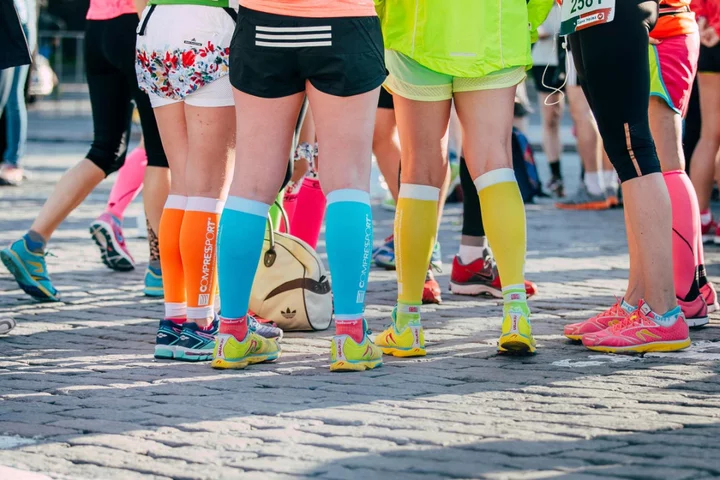
Common foot problems faced by runners – and how to solve them
Whether you’re taking on a marathon or running a 5k parkrun, your feet will make or break a run and a problem could put you off the activity for good. “Runners’ feet take a real battering, as you will know if you have recently run a marathon or even if you are new to running,” says GP Dr Gill Jenkins, an adviser to Excilor. “Feet bashing on hard ground, sweaty socks and shoes can all play havoc with your feet.” So, what problems could you face and how can you stop them hindering your progress? Blisters “Hot and sweaty feet usually mean blisters. As you start to run, your feet sweat, and the moisture in your shoes can cause friction, leading to blisters, says Joss Baldwin, Runners Need buyer. “Investing in a pair of running shoes made from breathable fabrics, with mesh vents on the uppers, boost airflow and allow any moisture to escape your shoes – reducing your risk of blisters,” “It’s also important to ensure your running shoes fit properly – shoes that are too tight or too loose increase the chance of rubbing and friction, only adding to the likelihood of blisters occurring.” Many trainer brands and sports shops such as Runners Need and ASICS offer gait analysis to help you choose the best-fitting shoes. “While breathable trainers are vital, wearing the appropriate socks will reduce your risk of soreness and rubbing. Invest in a good pair of technical run socks to keep your feet cool and wick the moisture away from your skin. Features to look out for are technical and sweat-wicking fabrics, mesh ventilation under the arch, as well as a snug fit,” says Baldwin. Athlete’s foot “Athlete’s foot is a fungal infection that occurs between the toes but can spread to the top and bottom of the foot if not treated. It can be very itchy and sore if the skin breaks, plus it spreads quickly in damp environments including running shoes but also changing rooms,” says Jenkins. It should not be ignored, and there are plenty of quick and easy treatments available in pharmacies. Ankle pain “When you’re first getting into running, foot problems can be common, but the good news is they are mostly avoidable,” says Baldwin. “Sometimes it is simply a case of getting your body used to the new activity, but all the time we see new runners in shoes that aren’t right for them. Overpronation, where your foot rolls in excessively, poor fitting and worn-out cushioning can cause a myriad aches and pains in your body. All are really easy to correct by getting a proper shoe fit and gait analysis.” There are different shoes for different activities that can protect your ankles and feet. “Everyone’s feet are different and that means everyone’s running shoe requirements are unique. Choosing the right shoe for your run can help avoid ankle pain,” says Baldwin. “If most of your training is on pavements, then road shoes are for you. With more cushioning than trail or lightweight race shoes, these will provide shock absorption to minimise your risk of injury. If you’re running through soft, muddy trails, you’re better off in a pair of trail shoes with a deep tread that offers better grip and ankle support, vital for running on uneven terrain. On pavements, however, these shoes will be uncomfortable as the studs will press into the soles of your feet and will wear away quickly.” He adds: “If you’re doing a little of each, you should consider a hybrid running shoe. These shoes work well on both roads and mixed trail conditions with a balanced mix of grip and cushioning.” Toenail problems “Toenail problems are commonly caused by a fungal infection and research for Excilor showed 49% of sufferers not aware they had a fungal nail infection,” says Jenkins. “Infections are incredibly common, especially with runners, and are also highly contagious, thriving on damp feet. Symptoms include discoloured nails and itchy and painful feet. Treat nail infections immediately as they can worsen rapidly.” Similarly, running long distances may damage the toenail itself. “The longer we run the warmer our feet get,” says Baldwin. “As they get warmer, they actually start to swell and become bigger. It is really important to take this into account when selecting your shoes. Typically we need to size our running shoes bigger than our normal shoes to stop our toes hitting the end of the shoe, which can cause our toes – and toenails – to become sore or bruised.” Read More Charity boss speaks out over ‘traumatic’ encounter with royal aide Ukraine war’s heaviest fight rages in east - follow live Paparazzi driver says Harry and Meghan chase was ‘catastrophic experience’ Regular exercise may lower risk of women developing Parkinson’s disease – study Number of children trying vaping rises 50% in a year
2023-05-19 15:50
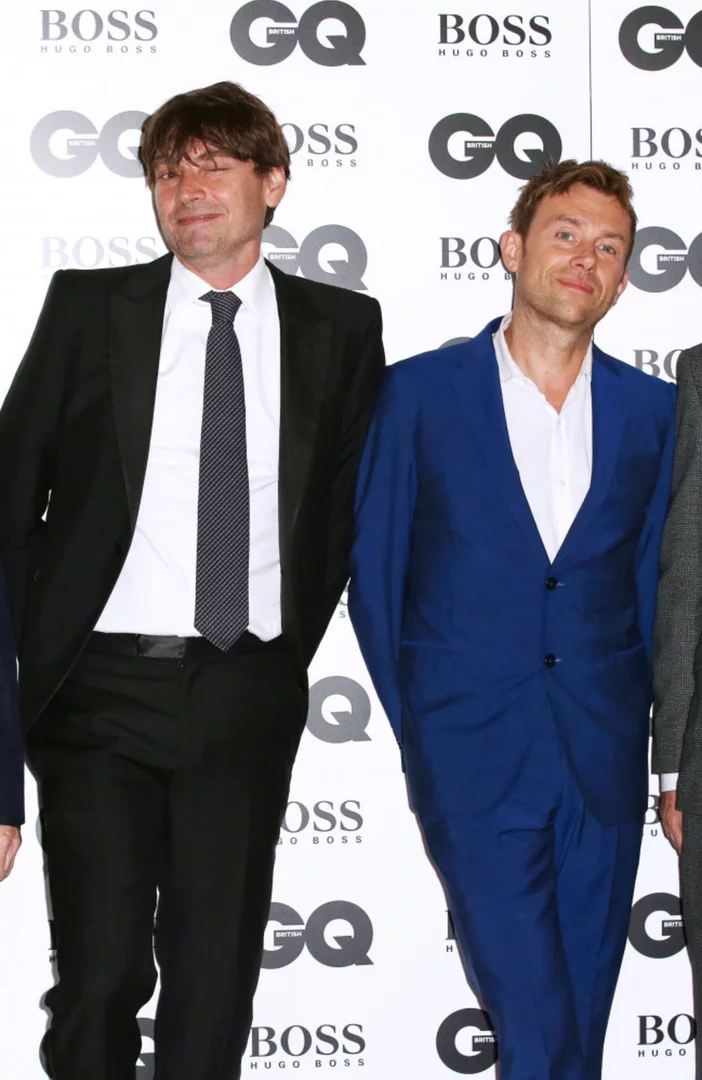
Blur announce new album
Blur are to release 'The Ballad of Darren', their first album in eight years, on 21 July.
2023-05-19 15:27
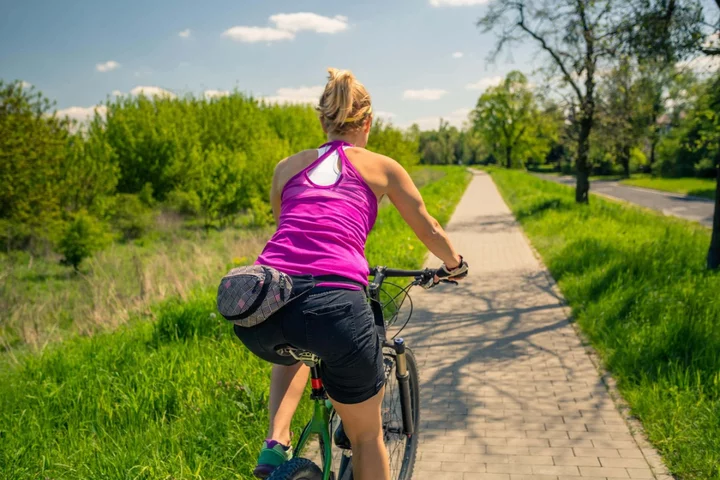
Regular exercise may lower risk of women developing Parkinson’s disease – study
Getting regular exercise such as cycling, walking, gardening, cleaning and participating in sports may decrease the risk of developing Parkinson’s disease in women, a study suggests. Women who exercised the most had a 25% lower rate of the condition when compared to those who exercised the least. The research also found that 10 years before diagnosis, levels of exercise fell at a faster rate in those with Parkinson’s than in those without, likely due to early symptoms of the disease. Experts suggest the findings support the creation of exercise programmes to help lower the risk of Parkinson’s. Our results support the creation of exercise programmes to help lower the risk of Parkinson’s disease Dr Alexis Elbaz, Inserm research centre Study author Alexis Elbaz, of the Inserm research centre in Paris, France, said: “Exercise is a low-cost way to improve health overall, so our study sought to determine if it may be linked to a lower risk of developing Parkinson’s disease, a debilitating disease that has no cure. “Our results provide evidence for planning interventions to prevent Parkinson’s disease.” Dr Elbaz added: “With our large study, not only did we find that female participants who exercise the most have a lower rate of developing Parkinson’s disease, we also showed that early symptoms of Parkinson’s disease were unlikely to explain these findings, and instead that exercise is beneficial and may help delay or prevent this disease. “Our results support the creation of exercise programmes to help lower the risk of Parkinson’s disease.” The study included 95,354 female participants, mostly teachers, with an average age of 49 who did not have Parkinson’s disease at the start of the study. The women were followed for three decades during which 1,074 of them developed Parkinson’s, and over the course of the study asked to complete up to six questionnaires. They were asked how far they walked and how many flights of stairs they climbed daily, how many hours they spent on household activities as well as how much time they spent doing moderate recreational activities such as gardening and more vigorous activities such as sports. Researchers assigned each activity a score based on the metabolic equivalent of a task (METs), a way to quantify energy expenditure. For each activity, METs were multiplied by their frequency and duration in order to get a physical activity score of METs-hours per week. For example, a more intense form of exercise like cycling was six METs, while less intense exercise such as walking and cleaning was three METs. The average physical activity level for participants was 45 METs-hours per week at the start of the study. Women in the study were divided into four equal groups of just over 24,000 people each. At the start of the study, those in the highest group had an average physical activity score of 71 METs-hours per week, while those in the lowest had an average score of 27. In the group that did the most exercise, there were 246 cases of Parkinson’s disease, compared to 286 cases in the lowest exercise group. After adjusting for factors such as place of residence, age of first period and menopausal status, and smoking, researchers found those in the highest exercise group had a 25% lower rate of developing Parkinson’s disease than those in the lowest exercise group when physical activity was assessed up to 10 years before diagnosis. They found this association remained when physical activity was assessed up to 15 or 20 years before diagnosis. The results were similar after adjusting for diet or medical conditions such as high blood pressure, diabetes and cardiovascular disease, researchers found. The findings were published in the Neurology journal. Read More Charity boss speaks out over ‘traumatic’ encounter with royal aide Ukraine war’s heaviest fight rages in east - follow live Number of children trying vaping rises 50% in a year All of the star cars to look out for in the new Fast X film Spice Girl Geri Horner ‘so proud’ of King Charles as she gives him a hug and kiss
2023-05-18 19:59

Why going sober could be the key to fitness success
Despite having ambitious fitness goals, or a desire to create a change in our lives, many of us are reluctant to give up alcohol. Surely it cannot affect our fitness routines and progress that much, just to enjoy a glass of wine, or a few beers at the pub? But, as Drinkaware explains, alcohol has a negative impact on physical performance, motor skills and brain function. So, what could going sober allow us to achieve health and fitness-wise? “Since going sober two years ago, my training performance, energy levels and mental clarity have skyrocketed,” says personal trainer Josh Davies, from Aimee Victoria Long personal training. So, how does it impact your fitness? Poor sleep and hydration Alcohol has plenty of detrimental impacts on our bodies that hinder our fitness performance. “Firstly, alcohol causes dehydration. We all know the importance of being hydrated when it comes to bodily function,” says Davies. “Secondly, alcohol has a huge effect on the quality of your sleep. Alcohol prevents the body from getting into deep and REM sleep – the part of your sleep that helps with recovery and restoration. “If you’re not getting adequate amounts of this type of sleep, you won’t recover between sessions and are unable to perform when working out.”Motivation and emotions A terrible hangover or consistent fuzzy feeling is not the best if you want to get up and go when it comes to fitness, and the result-restriction caused by drinking could be holding you back. “If you’re not seeing progression in training and you’re feeling tired from the effects of alcohol, your motivation levels are likely to wane,” says Davies. Similarly, its mood-lowering effects can make you want to do anything but workout. “Whenever I used to drink too much, I used to wake up the next day and feel awful. It would leave me not being the best version of myself and stop me from pushing myself to my limits with fitness. I’d feel low, depressed and all I’d want to do is stay in bed,” says Lauren White, addiction coach and former PT. “Alcohol would always make me depressed, I would isolate and want to be alone. I was always into fitness at a young age and knew I was good at it, but when I started getting into drinking too much, I stopped looking after my body and forgot myself and my identity,” she explains. Aids with weight loss Weight loss is not, nor should it be the only goal of a fitness boost, but if it is for you, giving up drinking may help. Nick Mitchell, CEO and founder of Ultimate Performance, says: “The problem with alcohol calories is they take priority as fuel in the body over other fuel sources, as the by-product of alcohol, acetaldehyde, is toxic and converts to acetate. “This means your body won’t start burning fat again until you burn those alcohol calories off. “In fact, alcohol consumption can be one of the major reasons that you are self-sabotaging your fitness goals. “Cracking open a can of beer or two to relieve stress – although it may seem a good idea at the time – will come back to bite you. It slashes testosterone levels in men and impairs muscle growth.“Beer, in particular, is terrible for anyone seeking to lose body fat, due to its high count of calories and its estrogenic effects. This latter point can’t be underestimated – hops are estrogenic and, as such, are the prime causes of many men, not just for beer bellies, but also for man boobs,” he explains.More time and money Quitting drinking will give you more time and money to focus that energy on goals such as strength training or distance running. “You could take up new hobbies and do things that stimulate your mind and give you that serotonin release that you feel from drinking. Furthermore, you can save a bucket load of money,” says Davies. “Alcohol is expensive and when you’re intoxicated, you lose clarity and can end up spending more and more money.” Read More Charity boss speaks out over ‘traumatic’ encounter with royal aide Ukraine war’s heaviest fight rages in east - follow live 5 of this summer’s hottest swimwear trends Teenagers with obesity should be offered weight loss drug, say experts Harry and Meghan ‘not contacted by royal family’ after car chase in New York
2023-05-18 16:22

Rachel Weisz opens up about suffering miscarriage for first time
Rachel Weisz has revealed that she suffered a miscarriage in the past, while speaking about her new series Dead Ringers. The actor, 53, discussed the negative reaction to scenes of childbirth and baby loss in the show. Weisz plays twin gynaecologists in the series, which is gender-reversed remake of the 1988 horror of the same title. Speaking to Emily Maitlis and Jon Sopel of The News Agents podcast, Weisz, who is married to fellow actor Daniel Craig, said she was “surprised” by the reaction, adding: “I was just telling this story about the female experience and it didn’t seem to have been like heightened or overdramatised. “Women had miscarriages, I’ve had a miscarriage, so you suddenly see blood coming out of your body and these are just all part of a female experience of being alive.” Weisz, a mother-of-two who prefers to keep her personal life out of the public eye, did not offer further details about when her miscarriage occurred. She continued: “I think we’re not used to seeing any of those things being represented cinematically or fictionally. So maybe this is breaking some new ground, this show.” The Favourite star also gave her thoughts on US anti-abortion activists who believe in the death penalty. “Both ends of life have different rules, it is very strange,” she said. “Children have to be born but there’s going to be no free healthcare for them. There’s no free schooling for children under the age of five. “And now every day, there seems to be more and more of a chance that you might get shot by an assault rifle at school. You can take life at the end of life; the government can choose to say you deserve to die. But at the beginning of life, a woman has no choice. How do you rationalise that?” Last month, the actor addressed the graphic birthing scenes in the first episode of Dead Ringers, describing them as “beautiful”. Speaking on BBC’s Woman’s Hour, she said: “[Writer Alice Birch] and I were really interested in showing birth in the first episode. I think we felt like it was something we don’t often see. “We’re incredibly used to seeing violence and people being killed, death, blood surrounding that. We’re almost immune to that at this point. For me, it’s a beautiful moment. It’s something we’re really interested in showing.” Weisz shares 16-year-old son Henry with former partner Darren Aronofsky and four-year-old daughter Grace with husband Craig. She married Craig, 55, in 2011 in an intimate ceremony in New York with just four guests in attendance. The James Bond star also has a daughter from his previous marriage to Fiona Loudon. Read More Grandmother praised for refusing to babysit daughter’s newborn unless she’s paid $20 an hour Denise Welch recalls losing ‘sense of reality’ from post-natal depression: ‘The most terrifying thing’ Chrissy Teigen praised for thanking team of four nannies in Mother’s Day tribute Grandmother praised for refusing to babysit daughter’s newborn for free Teenagers with obesity should be offered weight loss drug, say experts Women urged to check blood pressure – here’s what you need to know
2023-05-18 15:15
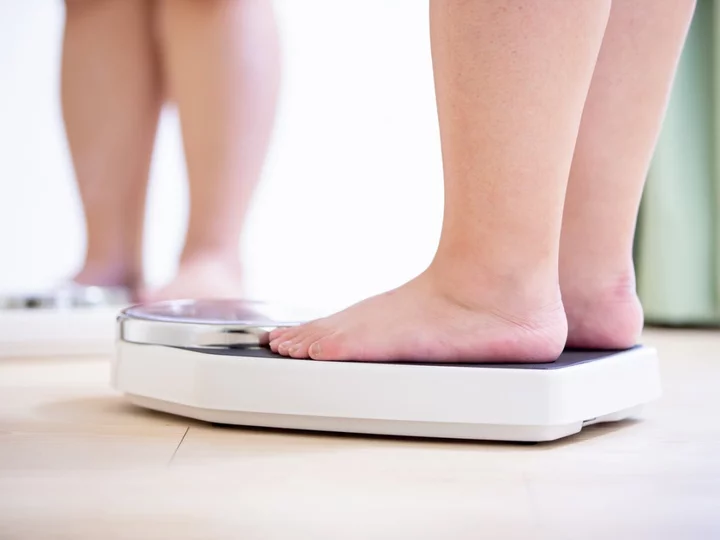
Teenagers with obesity should be offered ‘transformative’ weight loss injection, say experts
Teenagers should be offered a “transformative” anti-obesity treatment to help them lose weight, experts have said. Academics said that the weight loss injection semaglutide could help adolescents with obesity to shed pounds after a new study found an average weight loss of 40 pounds (18 kilos). Teens living with obesity were offered the semaglutide drug for more than a year in a new clinical trial. The study, published at the European Congress on Obesity in Dublin and the journal Obesity, found that 45 per cent of teens using the appetite suppressant drug were no longer classed as obese 68 weeks after starting treatment. This is compared to 12 per cent in a group who were taking “dummy” drugs – also known as placebos. Some 19.5 per cent dropped down into the “overweight” category and a quarter (25.4 per cent) were able to reduce their BMI into the “normal” weight category, the conference heard. The average reduction in body weight with semaglutide – sold under the brand name Wegovy – compared to placebo was about 40 pounds (18 kilos), researchers said. Many do very well with this medication though, and it can be life-changing for them Dr Aaron Kelly, University of Minnesota The authors of the paper conclude that “semaglutide represents an efficacious treatment option for adolescents with obesity”. But presenting the study, Dr Aaron Kelly, from the University of Minnesota Medical School in Minneapolis, USA, said that it should be taken as part of a package of measures to help teens living with the condition. He said that the earlier the treatment starts “the better” to prevent further weight gain. But he said that treatment should be taken long-term, as would be expected with other chronic conditions. Dr Kelly told reporters that there were side effects – mostly of nausea and vomiting – but these were “transient” and most dissipated over time. If you engage in treatment that’s effective, you’ll see an effect but if you take that treatment away – it’s like a rubber band, it’s going to come right back to where it started Dr Aaron Kelly “There’s a whole spectrum of outcomes when you use anti-obesity medications – some do really really well, some don’t do as well,” he said. “Many do very well with this medication though, and it can be life-changing for them. “Being a research scientist nothing brings me more pleasure than hearing the stories from the adolescents who have been struggling their entire life to manage their weight and haven’t been able to – it’s not about trying hard or not, they all try hard – this gives them a tool to help take control of their weight. “And that’s transformational for many teenagers.” He added: “I believe that health care providers should offer that as part of the comprehensive treatment approach – it’s not just one thing, it’s lifestyle therapy – which was included in this trial; it’s the use of anti-obesity medications and, for some, metabolic and bariatric surgery. “A question I get asked a lot is, ‘Is this going to solve the obesity problem? Should we just give it to everybody?’ No, it’s not going to solve the obesity problem, but it’s an important piece to the puzzle at helping to solve it especially for those who already have obesity.” Dr Kelly said that coming off the drugs would lead to weight coming back, adding: “Let’s use high blood pressure as an example, medications are commonly used and prescribed to treat high blood pressure. “And when they have prescribed, the intent of the health care provider – if (the drug is) tolerated and continues to be effective – effectively that person would stay on that medication, probably for the rest of their life. Obesity is exactly the same thing. “If you engage in treatment that’s effective, you’ll see an effect but if you take that treatment away – it’s like a rubber band, it’s going to come right back to where it started.” On when treatment should commence among teens, he added: “If obesity surfaces in childhood, it probably represents one of the most aggressive forms of obesity that we know of. “If you are a child or adolescent with obesity, you are highly likely to carry that obesity and excess adiposity into adulthood. You don’t just snap out of it. “My centre comes of the approach that the earlier the better. “And, and if medically eligible, the use of medications early is probably going to (give) the best outcomes over time because if you allow the disease to progress and the pounds to to add on over time, it gets harder and harder to draw that back. “And so conceptually, I think it makes sense to intervene early and not allow that to happen, and that probably gives the child the best shot at living a long, healthy, happy life.” Meanwhile, another study presented at the conference found that people who have shed weight may be at risk of “psychological scarring”. The paper, led by academics at the University of Liverpool, found that people who have had obesity, even if they have lost weight, could be at risk. Read More Gaining weight before 30 raises cancer risk decades later Artificial sweeteners do not help you lose weight, WHO warns How to talk to kids about weight and healthy eating Charity boss speaks out over ‘traumatic’ encounter with royal aide Ukraine war’s heaviest fight rages in east - follow live
2023-05-18 12:52
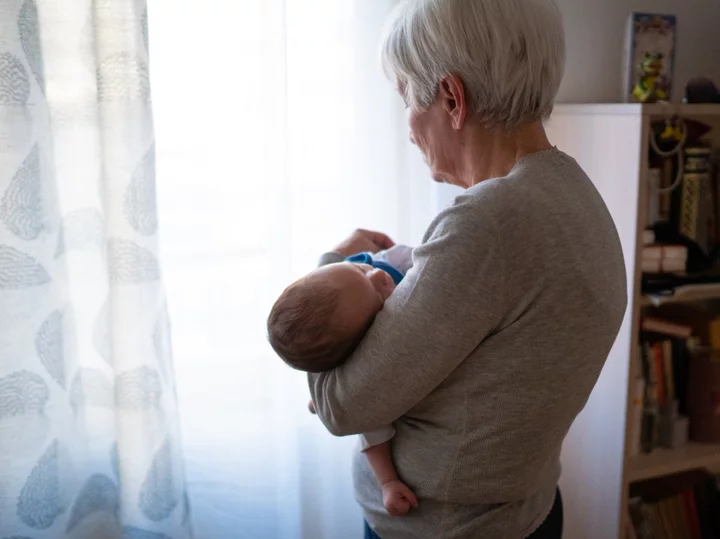
Grandmother praised for refusing to babysit daughter’s newborn unless she’s paid $20 an hour
A 29-year-old woman was in for a rude awakening when she asked the internet if her mother was in the wrong for refusing to babysit her newborn for free. “Am I the a**hole if my mom refused to help me take care of my baby while I go back to work?” u/erika_urrrika asked the popular Reddit forum. In her post, the new mother wrote that both she and her partner work full-time and cannot afford to have one parent stay home with their baby. The Redditor explained that their jobs don’t allow them to work from home, and they wanted to avoid spending money on childcare. In addition to being the breadwinner of the household, she is also saving money to pay off credit card debt and move to a bigger apartment. However, the grandmother refused to look after her grandchild for free, noting that she was “too old” and had “already raised her kids”. “Mind you, my mom is 64, has been a homemaker/stay-at-home-mom since 1992, and hasn’t been part of the workforce since then,” the daughter wrote. “She also added that if I really wanted this baby, then maybe I should have thought about staying home like she did to take care of it while my partner goes to work and provides for us like a ‘traditional’ family, and that if she any my dad were able to work it out, so can we.” When the Reddit user detailed her financial situation to her mother, she asked to be compensated $20 an hour for each hour she looks after her grandchild, including late fees for pickup. “So, am I the a**hole for wanting my mom, who again is at home all day long (trust me, she does not do anything besides watch TV and cook meals), to take care of my baby for free while me and my partner try to fix our finances?” she asked. In the comments, many Reddit users called the daughter “entitled” for expecting her mother to take care of her child for free. “Sorry to be blunt and rude but maybe don’t have a child if you can’t afford to take care of them,” replied one person. “And if your plan was always to go back to work you should have discussed that during the pregnancy with your mom.” “Your mother is under no obligation to babysit for you,” another user said. “Why are you having a child you don’t seem to know what to do with? And why have you not worked all this out before now?” A third person wrote: “Your mom is in no way obligated to care for YOUR BABY. It’s generous of her to be willing to do it for pay, and you have the gall to be mad she won’t do it for free? She is entitled to spend her life and free time however the hell she wants. It’s not her fault you’re in debt and decided to have a baby you can’t afford. The only thing she may have done wrong at some point along the line is raise you to be this horribly entitled.” “You chose to have a child, not your mother. Your mother isn’t a free babysitter,” another said. “She is right, she raised her children. Her babysitting on occasion would be kind and appreciated but you sound entitled thinking you are owed childcare.” One person simply commented, “You’re not the a**hole for wanting her too. But you’re the a**hole for expecting her to.” According to Sittercity, the average hourly rate of babysitters in the US in 2023 is $18.50 per hour, while the average hourly rate of nannies who “typically work on a full-time or set schedule basis” is $20 an hour. This isn’t the first time a babysitter has caused a stir on Reddit. Recently, a woman sparked a debate after revealing that she asked a family who cancelled on her babysitting services last minute to pay her half of the $840 she planned to charge them. The babysitter told Reddit’s AITA forum that she usually charges a “flat rate of $100 a night” while babysitting overnight. “Overall, the price for those three days was going to be $840,” she said. But when she received a text from the parents cancelling her babysitting services, she explained that she was “out three days pay”. In response to the last-minute cancellation, she asked the customer for $480, the “minimum [she’d] make at work in those three days”. She said the mother declined the request and said she was being “ridiculous”. While the babysitter noted that she and the family didn’t have a contract, “which in hindsight was stupid” and that “legally they don’t have to pay” her, she still felt that the right thing for the family to do was pay her. Read More Woman questions whether it was ‘selfish’ to refuse boyfriend’s request for $5,000 loan Babysitter asks family to pay half of $840 bill after they cancelled last minute People divided over whether you should switch tables in a restaurant if seated next to a crying baby Woman questions whether it was wrong to refuse boyfriend’s request for $5,000 loan Women urged to check blood pressure – here’s what you need to know Denise Welch remembers ‘losing sense of reality’ while facing post-natal depression
2023-05-18 02:48

Ex-vegan claims quitting diet ‘saved her life’
An former vegan whose hair started to fall out in chunks has claimed that eating meat “saved her life”. Kai-Lee Worsley, who is originally from Edmonton, Alberta, Canada, became vegan aftermoving to Santa Ana, California, in 2018. After moving in with a group of vegans, she learnt about factory farming, which is controversial due to the cramped and stressful conditions endured by livestock. She was then convinced to try veganism herself. “What convinced me is the way animals were treated. I didn’t know how animals were treated in factory farms. I didn’t know factory farms existed,” she said. Kai-Lee stopped eating all products derived from animals and started eating protein-rich vegetables, such as beans and legumes. She also used supplements to counter the lack of proteins found in meat. But six months into her new diet, she started to feel unwell. Her hair started to fall out, her fingernails became brittle and she found it difficult to stand up. “I was extremely tired all the time. I couldn’t form coherent thoughts,” she said. “I would just lie in bed multiple times a week and I would spend all day in bed if I could. “My nails were breaking all the time. My hair was falling out. I have thin hair anyway but my hair was just coming out in chunks.” Kai-Lee stuck to the diet until June 2019 when her symptoms became too intense to ignore. Less than a year after becoming vegan, Kai-Lee started eating meat again and has credited it with “literally [saving] my life”. ”Now I eat basically the same thing as when I was a vegan except I have steak three times a week. I’ve swapped meat substitutes for meat. It has literally saved my life,” she said. Despite feeling the benefits of eating meat, Kai-Lee morally struggled to abandon her vegan diet. Kai-Lee said: “I really thought veganism was something I wanted to do for the rest of my life. I even saw myself as an activist. “After I ate meat, I saw myself as a fraud. I even had a V tattoo in my ear, which stood for vegan. I was at that point when I was so indoctrinated that it was really hard to go back. “I didn’t tell anyone at the beginning. I was worried what they would think about me.” She concluded: “I think when you’re so indoctrinated in something it’s really hard to back away, but I’m glad that I was able to do it in time.” Read More Janey Godley shares heartbreaking cancer update Gaining weight before 30 raises cancer risk decades later Teacher, 25, rushed to hospital with stomach ache diagnosed with terminal cancer Pensioner, 85, shares the simple switch that’s helped him to do 650,000 press-ups How to check if you have skin cancer: Symptoms and signs to look out 6 mouth cancer symptoms everyone should know
2023-05-17 17:50
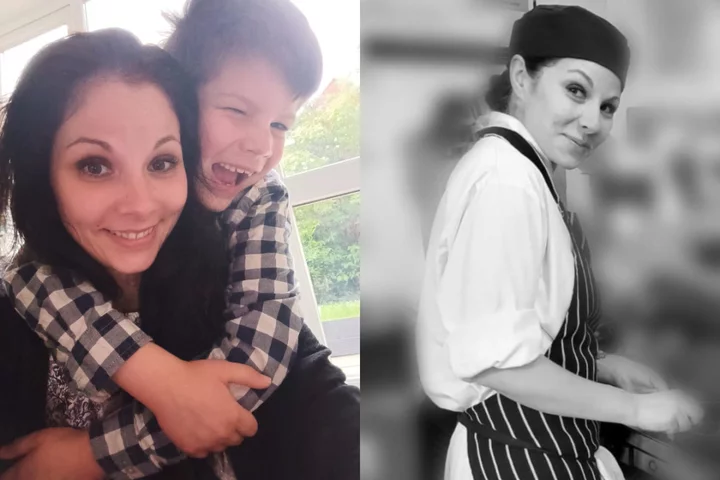
Chef whose blood flows backwards says excruciating pain ‘cuts like a knife’
A single mum whose blood sometimes flows “backwards” has been left in excruciating pain and living “penny to penny” after a CT scan revealed she is likely to have pelvic congestion syndrome – but the next available appointment is not until 2024. Lolita Vaciete, 33, called the NHS in tears and begged them to expedite her treatment but was told she would have to wait a year before she could see a blood specialist about her condition, which is not life-threatening but makes everyday tasks like taking her eight-year-old son Jakob to school a logistical nightmare and means she runs the risk of passing out while on her period. While waiting for her appointment, Lolita, who has worked as a gourmet chef for 15 years, has been prescribed “strong painkillers” to help cope with the agony which she describes as like being “cut with a knife”. She was forced to take sick leave in March as she cannot stand up for more than a few hours at a time, and says the decision to postpone her treatment has “ruined her life” and that if her income continues to dwindle, she will be plunged into debt. Faced with no other option, Lolita is looking to raise money to afford private medical treatment as she fears Jakob is also suffering because of her condition. Pelvic congestion syndrome is a long-term condition where veins in the lower abdomen stop working properly, allowing blood to back up, causing the veins to become congested. Lolita, who lives in Milton Keynes, said: “Taking care of my son is what keeps me going and helps me find the strength to continue doing stuff, even though I can’t physically. “I feel like I’ve been locked in a box and told to just stay and wait. “I don’t understand how it can take 14 months for a blood specialist and gynaecologist to see me.” Lolita did not think it was “serious” when she started feeling pain around her abdomen in June last year. But over the next few months she rapidly lost weight and the pain intensified. “In the past year, I lost two stone without even trying,” she said. “Every time I moved, it felt like someone was cutting me with a knife in the right side of my abdomen. “I was very weak and couldn’t stand up for long without feeling dizzy. “I was constantly going to the toilet, like every half an hour.” In November, Lolita visited Milton Keynes University Hospital after the pain became unbearable and returned for a CT scan a month later which revealed she was likely to be suffering from pelvic congestion syndrome. “The scan showed my blood vessels were dilated,” she said. “They should not be more than 5mm and one of my veins was already 8mm.” She was told a meeting would be scheduled the following month with a blood specialist and gynaecologist to review the scan and confirm her diagnosis, but that never happened. She said: “I received a letter saying somebody will call me in a month’s time to schedule the appointment. “But I didn’t hear anything back, so I called them and received another letter saying my appointment had been delayed.” This went on until last month when Lolita received a letter saying she would not be able to see a gynaecologist until April 2024 and a blood specialist until June 2024. I feel like I've been locked in a box and told to just stay and wait Lolita Vaciete “I called them in tears and said it was urgent, but they could only move the gynaecologist to February 2024,” she said. “I can’t believe that it takes so long to see a gynaecologist.” While Lolita’s condition is not life-threatening, her world has been turned upside down and there is a chance she will have to have her uterus removed. “Whenever I get my periods, I have to stay in bed because I can pass out from losing too much blood,” she said. “If you look at who I was a year ago and who I am now, it has had a huge impact. “Everything I do has to be simplified and my life has become five times slower.” Even simple tasks like taking Jakob to school, a 20-minute walk down the road, have become an ordeal. “I am a single mum and I don’t have any support around me,” she said. “When my blood starts flowing backwards my blood pressure changes quickly, so I can be washing up and then I suddenly need to sit down.” Lolita was working as a fine dining chef until March but was forced to take sick leave as her condition got worse. “I was working full time but I’ve had to stop because I can’t be in a hot environment or standing for long hours,” she said. “I’m on sick leave but I’m getting paid less and less money. “If it continues I think that I will end up getting into debt this summer. “I’m literally living penny to penny to pay my bills.” Lolita says her condition is extremely severe and is also impacting her son who is not accustomed to seeing her so weak and does not fully grasp the situation. “I’m asking because I’m desperate for me and for my son,” she said. “I have noticed that he has been feeling a little down recently and I think it’s because he is used to seeing his mum as a strong woman.” While waiting for treatment, Lolita has been prescribed strong painkillers to help ease the agony. “That’s how they want to fix me, ‘here, take a tablet and carry on’,” she said. But there is nothing she can do to improve her condition other than avoid certain foods like vegetables which thin the blood. “It just feels as though my life isn’t important enough,” she said. Lolita says her GP suggested the backlog may be due to the NHS strikes announced in November. With nowhere else to turn, Lolita has set up a GoFundMe page and has raised more than £500 of her £4,000 target to pay for treatment called vein embolisation. “I looked at going private but the costs are too big, I just can’t afford it,” she said. “I spoke to my friends and they suggested I start a GoFundMe page. “This money will help me get treatment this year, and I will be able to make beautiful memories with my son this year. “My heart is breaking when he doesn’t understand why I am not the same. “I am suffering alone and losing hope.” To find out more about Lolita’s fundraising, visit www.gofundme.com/f/help-end-lolitas-pain. A spokesperson for Milton Keynes University Hospital said: “Ms Vaciete came in via our Same Day Emergency Care unit for urgent same-day assessment. Following triage by a clinician and a CT scan, Ms Vaciete was booked in for a non-urgent routine outpatient appointment. “This is currently scheduled for February 2024 as the next available appointment. “We are constantly reviewing our waiting lists and aim to bring appointments forward where possible, with patients being seen in order of clinical priority. If Ms Vaciete’s symptoms are getting worse, we would advise that she contact her GP.” Read More Gaining weight before 30 raises cancer risk decades later Teacher, 25, rushed to hospital with stomach ache diagnosed with terminal cancer Charity boss speaks out over ‘traumatic’ encounter with royal aide Ukraine war’s heaviest fight rages in east - follow live
2023-05-17 15:49

Woman’s horrifying buccal fat removal ordeal: ‘I was in excruciating pain’
But Pammie was unaware of how much of a change it would make to her face and urges people not to go ahead with the procedure. Read More Janey Godley shares heartbreaking cancer update as husband reacts: ‘I thought he was being sick’ Bride sparks outrage after documenting everything she ate at her wedding Manspreading remains the most misunderstood of modern evils The vitamins, fruits and vegetables to prioritise as the seasons change A bride has split the internet in half over her wedding menu Gemma Collins urges women to talk openly about incontinence
2023-05-16 22:49

Gemma Collins urges women to talk openly about incontinence
Gemma Collins has called on women to discuss the issue of incontinence more openly to dispel stigma around it. The former Towie star, 42, aims to help women overcome shame or embarrassment around the “taboo” subject in a new campaign. Collins recalled an incident when she first experienced incontinence while playing with her nephew on a trampoline. She told BBC News: “I couldn’t believe it, I was on a trampoline, you know, although I’m 42, I still think I’m 21. “And I was on – and you know, like, with your mums and your aunties, you’ve always heard growing up, ‘Oh my God, I need a pad, I’ve got leaks’ and you’re like, ‘Eugh, I will never get to that stage in my life’. “Well, honeys,” Collins continued. “It’s happening. I got on my trampoline with my nephew Hayden and I was having a great time and literally, I was laughing, I was jumping, and the leak just started happening.” Collins joked that the experience made her feel “officially old”, then added: “No, it’s nothing to do with age, so many women get it. One in three are suffering from it.” According to the NHS, urinary incontinence is the unintentional passing of urine and is believed to affect millions of people. The condition affects twice as many women as men due to pregnancy and childbirth, which can impact the bladder, urethra and other muscles supporting these organs. However, Collins said incontinence shouldn’t stop women from going out and living their lives. “Would I have stopped jumping on the trampoline? Hell, no,” she said. “It is really sad to know that women are stopping doing their activities. They might not want to go on holiday now because of their leaks. They might not want to get on a trampoline with their children or their families because of the leaks.” Collins added: “Nothing’s ever going to stop me from doing anything in my life. But why are women so embarrassed to talk about it still?” The TV personality has spoken candidly about her experiences with incontinence in the past. In 2017, she fell into a trap door in a stage while presenting the Radio One Teen Choice Awards in a moment that went viral online. But the following year, she revealed that the embarrassing moment was made worse by the fact she “wet herself” after the fall. “The worst thing about it was that I wet myself as it was such a shock,” she told OK! magazine. “James [Argent] came running down from the audience to make sure I was OK and all I could think was, ‘I hope he can’t tell I’ve wet myself’. “That hole changed my life, it catapulted me into a meme star,” she added. Read More Janey Godley shares heartbreaking cancer update Dwayne Johnson reveals he’s struggled with ‘three bouts of depression’ Manspreading remains the most misunderstood of modern evils Janey Godley shares heartbreaking cancer update Teacher, 25, rushed to hospital with stomach ache diagnosed with terminal cancer How to check if you have skin cancer: Symptoms and signs to look out
2023-05-16 20:51

The vitamins to prioritise as the seasons change
If your social life has ramped up now that it’s spring, it can be easy to let the little things you do for your health slip a bit. But it’s just as important to ensure you get all the right vitamins and minerals as the seasons change. So what should we be prioritising right now? Vitamin D You may be getting more sunlight now but it is still important to maintain good levels of vitamin D. “Levels of vitamin D will be low at the end of the winter and moving into spring”, Public Health Nutritionist Dr Emma Derbyshire from the Health & Food Supplements Information Service (HSIS) says. “Vitamin D is important for the absorption of calcium and healthy bones and teeth as well as for immune function. “The UK government recommends that we all take a 10 microgram daily supplement throughout the year but especially in winter through to spring. If you haven’t taken vitamin D throughout the winter your levels will likely be low, so top up now with a supplement.” Vitamin C “Vitamin C is a powerful antioxidant,” says Derbyshire. “With warmer weather you will be spending more time outside with more exposure to the outside air. “Vitamin C protects cells from the oxidative damage caused by pollutants. [It] also helps with the absorption of iron. Many women are short of iron particularly during their reproductive years so boosting vitamin C intake helps to reduce the risk of iron deficiency and the tiredness and fatigues that can cause.” You can find it in citrus fruits, tomatoes and peppers. “For those finding it hard to eat their five fruit and vegetables a day, then I would recommend taking a multivitamin and multimineral supplement to ensure your body is fuelled with an a-z of vitamins and minerals including vitamin C and iron,” Derbyshire adds. B vitaminshttps://twitter.com/johnnyxbrown/status/1650549580080066565 B vitamins include thiamin (vitamin B1), riboflavin (vitamin B2) and vitamin B6, niacin (vitamin B3), pantothenic acid, vitamin B6 (also known as pyridoxine) and biotin (vitamin B7). “Vitamins B one, two and niacin help release energy from food and are essential for the health of the nervous system,” says Derbyshire. “[This season] we want to feel energetic and for our nerves to be healthy so that we can best enjoy all the activities we have missed over the winter. These B vitamins help to reduce tiredness and fatigue.” Look for thiamin in peas and nuts, riboflavin in eggs and mushrooms, niacin in meat and wheat flour, and pantothenic acid in avocado and liver. Vitamin B6 can be found in pork, peanuts and bananas, but we only need very small amounts of biotin and the NHS say it’s not clear if we need additional biotin from our diets or supplements. Vitamin B12 Though it is a B vitamin, it is important to look at vitamin B12 independently, says Derbyshire, as it impacts so many different aspects of our health. “Vitamin B12 is essential for several issues we need help with in the spring – from immune function to tiredness and fatigue. “Spring is also a time when you might decide to cut back on the stodgier foods of winter. You might opt for a plant-rich diet which is healthy but if you cut out meat and other animal-source foods you are at risk of vitamin B12 deficiency. “If you decide to make a change to your diet this spring take a multivitamin supplement to make sure you are topped up with the nutrients that could be missing from your diet,” adds Derbyshire. Folate “Folate is vital for immune function which may have taken a battering by springtime. It’s also important for reducing tiredness and fatigue,” says Derbyshire. “Top up your levels by eating kale, broccoli, spinach, chickpeas and a supplement containing folic acid.” Read More Charity boss speaks out over ‘traumatic’ encounter with royal aide Ukraine war’s heaviest fight rages in east - follow live 5 top tips to increase the chances of selling your property faster Drag queen Ella Vaday plans on ‘bringing camp to the campsite’ in 100km trek A beginner’s guide to topiary
2023-05-16 20:50
